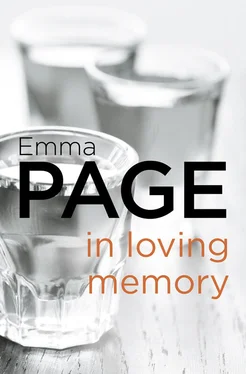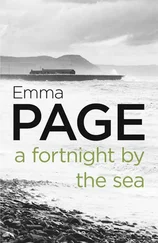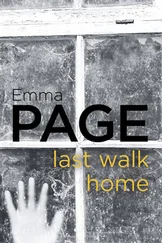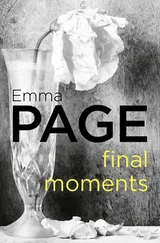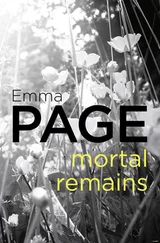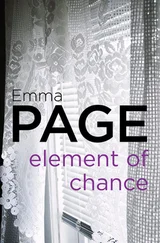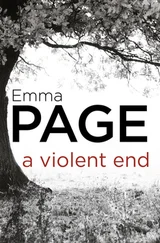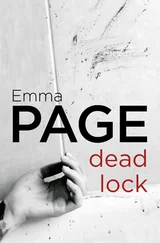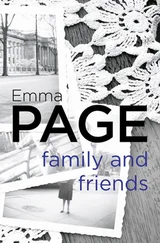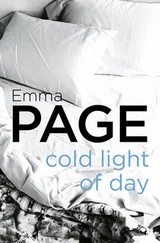‘Suppose Kenneth calls here before you get back?’
‘You’ll just have to play it by ear.’ He could trust Carole to do that. She would handle the situation as well as he could himself, better actually, if he were to be honest. She had an instinctive knack of saying the right thing at the right time.
‘I’m leaving in five minutes,’ Kenneth Mallinson said into the phone. ‘I spent a couple of hours last night going into the figures.’ Up till four o’clock in the morning, staring at the wretched figures, if the truth were told, but one didn’t need to tell one’s junior partner everything. ‘And I’ve decided to hang on for a little while longer, I think I may be able to raise some more capital.’
‘Just how long is a little while?’ The junior partner knew better than to ask Kenneth Mallinson exactly where he proposed trying to raise twenty thousand pounds. If the information weren’t volunteered in that first moment, a direct question wasn’t going to elicit it.
‘Two or three weeks, less perhaps. I can let you know in a day or two.’
When he gets back from Rockley, the junior partner thought, after he sees his ailing father. Was he proposing to approach the old man for a loan? Hoping for a death-bed reconciliation? Something of that kind? He might pull it off of course. One never knew with families. It might be possible.
‘About that job I’ve been offered,’ he said. ‘They’ll want an answer in a few days.’ All things being equal, the junior partner would much prefer to stay on in business with Kenneth Mallinson. But if the firm was on the verge of bankruptcy he’d be glad of the job. Quite a good opening really.
‘I’ll let you know,’ Kenneth said. ‘You can stall them for a day or two.’
‘What do you want me to do while you’re away?’ the junior partner asked. ‘Go round to the bank and try to talk the manager into giving us more time?’
‘Yes.’ Quite good at that, the junior partner, better than Kenneth Mallinson, who found it hard to go cap in hand to any man. ‘Tell him I’ll be in touch with him in a day or two.’
‘Right you are. I hope you find your father on the road to recovery.’ Though was that what his senior partner wanted? Would it not in many ways be more convenient if he found his father on the point of death? With just enough remaining strength to put his signature to a cheque, to summon his solicitor to draw up a new will?
‘I don’t think he’s all that ill,’ Kenneth said. ‘From what Doctor Burnett told me. You can phone me at the local pub, Rockley village that is, the Swan, if you need to get in touch with me urgently.’
‘You’re not staying at the house then?’ Surprise in the junior partner’s tone.
‘No, they won’t want to be bothered with extra work just now. It’ll be more convenient for them if I get a room at the pub.’
And more convenient for you as well, the other man thought, smiling wryly to himself. No one to overhear your phone calls, no one to realize just how rocky our finances are at this moment.
‘Have a good journey,’ he said, and replaced the receiver.
A few minutes later Kenneth Mallinson picked up his overnight bag and let himself out of the flat. No wife to smile a farewell on the threshold. He had never felt the impulse to marry. The deep channels of his emotions had always been directed towards his mother, the youthful energies of his affections had spent themselves in trying to ease the silent unhappiness of her existence, to make up to her in some tiny measure for the huge error of her marriage to Henry Mallinson, a man whose cold strong nature could not even begin to comprehend how a woman with a warm and loving nature might shrivel and wither from simple lack of the caressing hand of love.
It had taken Kenneth years to recover from his mother’s death – if he had ever truly recovered. He had come in the end to accept the fact that she was gone, that things hadn’t after all come right for her, that she had died at last from nothing more complicated than a broken heart. By the time he had contrived to construct a shield of armour around his inner turmoils, he was approaching forty and as far as marriage was concerned it was already too late.
He eased the car out on to the main road and pointed it towards the south, towards Rockley and Whitegates. I suppose I’ll have to see David, he thought, staring out through the windscreen. And that wife of his, Carole.
He had seen the photographs in the newspapers, the pretty, fair-haired girl standing demurely smiling beside her new husband. Father would like a daughter-in-law like that, he thought, a quiet, compliant girl, one who would fall in with his wishes, play her part in the Mallinson scheme of things, provide him in due course with grandchildren to carry on the family business long after he was dead and gone.
The early-morning traffic began to thicken. As he drove through the outskirts of a town he saw the first sleepy shopkeepers beginning to raise the blinds, to attack the windows with wash-leathers and buckets of water.
‘Thirty pounds!’ Tim Jefford stared at the proprietor of the tiny shop with horrified disbelief. ‘Thirty pounds for one miserable coin!’
‘Guineas,’ said the proprietor smoothly. ‘Thirty guineas. You won’t do better elsewhere. Fine condition and a rarity of course. You’d be hard put to it to find another like it in the whole of London.’ He didn’t waste time addressing the wild-looking young man as Sir. Hardly likely that a fellow like that, greasy jeans and a shirt very little acquainted with the wash, would spend thirty guineas on a Roman coin. He yawned delicately into his hand.
‘Twenty-five pounds,’ Tim said desperately. ‘Not a penny more.’ No use in buying anything cheaper, the coin had to be a rarity if it was to serve any purpose at all.
The shop-keeper flicked up his eyes with new interest.
‘Twenty-seven pounds ten,’ he said briskly.
‘Twenty-five,’ Tim repeated, regretting now that he hadn’t started bidding at twenty. ‘I’ve only got twenty-five.’
‘Twenty-five it is,’ the shop-keeper said at once, recognizing the truth when he heard it. The fellow thrust his hand into the pocket of his jeans and drew out a fistful of notes, a scattering of coins. When he had counted out the money there were only the coins left on the counter, a few shillings at most. Paint-stains on the long fingers with their grimy nails. A sudden access of sentimentality took the shopkeeper by surprise, carrying him back all at once to the far-off days of his own youth, to his stall in the street market, his poverty-stricken cronies for ever dabbing at canvases with oils, for ever tapping out their immortal novels on ancient typewriters, hacking in unquenchable optimism at great lumps of stone.
‘You can have it for twenty-two pounds ten,’ he said abruptly, astounded at his own folly. The fellow looked as if he hadn’t eaten three good meals a day since he’d left home, whenever that might have been.
Tim snatched back the two pounds ten before the shopkeeper could change his mind.
‘Thanks,’ he said with a grin. ‘You’ve saved my life. Could you put the coin in a box? Something impressive-looking?’
The man nodded and groped on the shelf behind him, restraining himself with difficulty from enquiring why his customer should be willing to spend every pound he had on a coin of a long-dead empire.
And now for the public library, Tim thought, standing on the pavement again. A book about coins, two or three books perhaps. He’d have to study them on the way to Rockley, pore over them in his room at the pub, if he was going to be able to make any kind of showing with old Mallinson.
He walked along the busy street, whistling. A dark grey suit – he knew a lad who still had a dark grey suit, hadn’t yet parted with it for a few pounds to a second-hand shop. And he knew where he could borrow a couple of near-white shirts. And a decent suitcase. Pyjamas, he remembered suddenly. Better have a pair of pyjamas. He frowned and ceased his whistling. He’d better try and lay hands on a dressing-gown too.
Читать дальше
